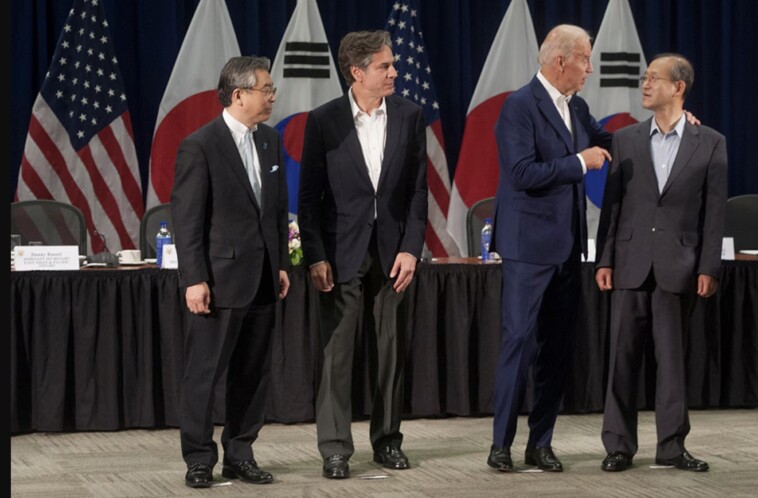
Since taking office, President Biden has overseen a botched U.S. withdrawal from Afghanistan, leaving billions in military equipment and weapons with the Taliban. He has involved the U.S. in the Ukraine war, sending tens of billions to Kyiv, strained relations with Saudi Arabia, and failed to stop Iran and the Houthis from destabilizing the Middle East. Recently, he handed over a key U.S. Africa Command base to Niger’s military junta.
President Biden’s foreign policy has been characterized as “leadership without hegemony,” in contrast to Trump’s approach, which combined diplomacy with power. While negotiation and consensus are often seen as liberal tools of diplomacy, the primary responsibility of the U.S. president is to act in the best interests of America. This means not allowing countries like China or Russia, or global institutions like the UN, to influence domestic U.S. policies or limit its actions. Therefore, maintaining hegemony remains crucial.
Preserving hegemony is essential to maintaining the high standard of living in the United States. This necessitates having foreign policy interests in every corner of the globe. Although taxpayers may be growing weary of supporting these efforts, it explains why the U.S. maintains 750 military bases in 80 countries. These overseas bases are crucial for ensuring the successful achievement of U.S. foreign policy objectives.
Only about 40% of U.S. adults believe foreign policy should be a top priority, according to a recent survey. Many Americans view distant wars, terrorism, and rivalry with China and Russia as issues that don’t impact their daily lives. They’re more concerned with domestic matters like inflation, jobs, taxes, crime, drugs, and border security. However, these pressing domestic issues are all heavily influenced by foreign policy.
What happens outside the U.S. directly impacts what happens inside the country. Economic and political shifts in China or Brussels can influence U.S. jobs and exports. Conflicts in the Middle East can cause oil prices to surge. If Beijing closes the Taiwan Strait or pirates impose taxes in waters around Somalia, the Red Sea, or the Strait of Malacca, global shipping could be disrupted, leading to shortages and soaring prices.
All countries have foreign policy, but the U.S. is uniquely positioned to influence global events for better outcomes at home. It has the world’s most powerful military, is second in nuclear capability, and is among the few nations with nuclear weapons. Economically, the U.S. is number one, with the largest and most developed capital markets and the most widely used currency. The U.S. is home to some of the world’s largest international companies and is the hub of technological innovation. Additionally, U.S. trade sanctions can cripple a country’s economy.
The U.S. was instrumental in forming major global institutions like the UN, IMF, and World Bank, and it retains significant power within them. Notably, the U.S. sits on the UN Security Council and can veto military actions. A crucial, often overlooked advantage is that the U.S. sets international standards in areas like accounting, computer systems, email, and search engines. Other countries must comply with these standards to market products globally, giving the U.S. a significant edge and making it the top country for service exports.
Given its strengths, the U.S. has the ability to stay on top, which is crucial for maintaining its standard of living. Many Americans agree that a better industrial policy is needed to revive American manufacturing, reducing dependence on rival China. Manufacturing has traditionally created jobs and provided a path to the middle class. U.S. exports bring in foreign money, and successful, export-oriented manufacturing attracts foreign direct investment (FDI), boosting the economy.
Exports impact Main Street directly, as the U.S. is the largest agricultural exporter, with farming-dependent states relying heavily on this income. Therefore, U.S. foreign policy must support these exports by protecting sea lanes and ensuring payments continue in U.S. dollars.
Russia and China both aim to end U.S. hegemony. Russia has the largest nuclear arsenal, with China third, and their militaries rank second and third globally. Both seek to end dollar dominance, with China pushing for the yuan as the world’s currency. They want to reshape the global order, relegating the U.S. to a minor role, with Xi Jinping openly aiming for China to become the new hegemon.
If Russia wins in Ukraine, it would make the U.S. appear weak, emboldening Moscow and other autocrats to launch invasions. Conversely, Russia’s collapse would undermine China’s ambitions by eliminating its main ally. A Russian victory would also be a win for China. Currently, the U.S. sets the global rules, but a world where China and Russia hold that power would be far less pleasant to live in. To prevent this, the U.S. must continue to prioritize strong foreign policy, backed by its military, economy, and alliances.
Biden was wrong in thinking the U.S. could manage both Russia and China through leadership alone rather than hegemony. Hegemony is necessary to maintain the U.S. standard of living.

